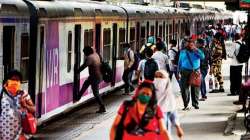COVID-19: Local train travel curbs in place as govt has responsibility to see people don't die, Maha tells HC
Senior advocate Anil Anturkar was arguing on behalf of the state government on a public interest litigation claiming that the restriction imposed on unvaccinated persons was illegal and in breach of their fundamental right to move freely across the country as guaranteed under Article 19 (1) (d) of the Constitution.

Justifying the restrictions imposed on local train travel in Mumbai amid the COVID-19 pandemic, the Maharashtra government told the Bombay High Court on Friday that, as a welfare state, it had a responsibility to ensure its citizens "did not die." Senior advocate Anil Anturkar told a bench of Chief Justice Dipankar Datta and Justice MS Karnik that the Maharashtra government had prohibited unvaccinated persons from traveling on local trains in the city to check the spread of COVID-19.
Anturkar was arguing on behalf of the state government on a public interest litigation claiming that the restriction imposed on unvaccinated persons was illegal and in breach of their fundamental right to move freely across the country as guaranteed under Article 19 (1) (d) of the Constitution. The government counsel said the restriction was a reasonable one and was meant for greater good.
"It is my responsibility as a welfare state to see that my citizens don't die. I don't want anyone, including Mr Ojha's client (the PIL petitioner) to die," Anturkar said.
He submitted that the government was entitled to give a preference to the larger good over one person's personal liberty, choice, and rights. He said an individual's right to life and liberty under Article 21 was not absolute, and that as per SC judgements in some cases, it was necessary to protect a person's, including the petitioner's, life.
"The SC judgements say even if the petitioner says he doesn't care about his own life, the State is right in protecting his life and the lives of the larger population," Anturkar said. The bench. however, asked the state government to submit minutes of the meeting in which COVID SOPs, including the prohibition on local train travel for the unvaccinated, were decided.
The HC said it wanted to know whether the state expert committee had applied its mind before imposing such restriction on the unvaccinated, and whether the reasons were recorded in the minutes of its meetings. "Our concern is for the entire population of Maharashtra. We have to check whether any decision of the state government infringes upon any section of the society," HC said.
"The state must dispel all apprehensions of the citizens since it has said it is applying its parens patriae jurisdiction," it said. The HC was referring to the state's earlier submission that in imposing such restriction, it was exercising its jurisdiction of the parent or guardian of the state's citizens. HC will hear the matter further on February 7.
Also Read | K'taka Hijab row grows as another college denies entry to girls, boys protest in solidarity
Also Read | Gautam Adani becomes richest Asian and 10th in world